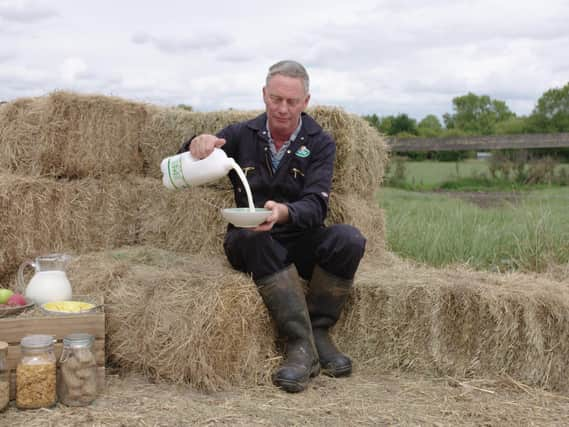How the lockdown baking frenzy helped to support 1,350 jobs across Yorkshire at Arla


Farmer owned Arla reshaped its business to meet the spike in home consumption and high demand for household dairy products.
Arla employs 1,350 people across Yorkshire, at its head office in Leeds, and sites in Settle and Stourton. Although some timelines have slipped slightly due to coronavirus, a spokesman said Arla is "very much on track" to start producing Arla Lactofree fresh milk from Settle this year.
Advertisement
Hide AdAdvertisement
Hide AdLactofree is currently made in Denmark with milk from Arla’s Danish farmer owners, but, with an investment worth more than £25 million Arla has decided to also start producing Arla Lactofree in Settle using milk from its Yorkshire and UK farmer owners.
Arla’s ability to adapt to the changing market in the UK saw it record a total revenue of £2.12bn in 2020 up from £1.95bn in 2019. The growth came in both Arla’s branded business, at 13 per cent strategic branded revenue growth and in its own label offering which grew 4 per cent in volume driven revenue growth.
Arla Foods UK MD Ash Amirahmadi , said, “Our branded business increased when consumers turned to food products they trusted during lockdown. This was seen most significantly in branded butter when the nation searched for quality ingredients for baking.
"But it was the volume growth and the support of our retail customers that enabled us to flex our business and ensure the public had access to dairy when lockdown drove a significant increase in retail demand, particularly for own label milk and cheese.”
Advertisement
Hide AdAdvertisement
Hide AdMr Amirahmadi told The Yorkshire Post that 2020 had been defined by COVID-19 and the company had placed the emphasis on the safety and wellbeing of its people, who were defined as critical workers.
He added: "Our farmers played their part in ensuring our products arrived every day."
He said Arla's farmers had continued to take climate data and focus on raising animal welfare standards, despite the pressures caused by the pandemic. Arla works with 185 farmers in Yorkshire
Mr Amirahmadi added: "We see plenty of opportunity to keep growing and that comes with investment."
Advertisement
Hide AdAdvertisement
Hide AdKey brands which saw positive strategic branded growth in the UK including the Arla brand overall (+8.8 per cent) driven by Cravendale (+23 per cent), Lactofree (+11 per cent), Anchor (+9 per cent) and Lurpak (+15 per cent). While Arla’s UK production produced record volumes overall, increased imports of Lurpak from Denmark helped ease demand pressures for butter in UK supermarkets.
A spokesman added: "The nation's baking frenzy did help drive butter sales. For context on the numbers, last year we sold around 67m blocks and tubs of Anchor and a whopping 150m blocks and tubs of Lurpak in the UK."
The statement added: "While overall revenue grew, the figures also reflect some of the difficult decisions Arla had to make to ensure there was enough dairy for everyone during coronavirus. To maximise overall volume output, a number of Arla’s value added brands temporarily ceased production or were reduced in volume, with Big Milk and Skyr Arla sub brands seeing reductions in strategic branded growth last year of -5.1 per cent and -12.9 per cent respectively."
Arla Foods UK Finance Director Simon Ho, added: “I’m very proud that we can look back at our 2020 results and see the positive impact of our flexible approach to business, in what was a very challenging year. Around 50 per cent of Arla’s products were impacted by production decisions needed to keep our colleagues safe during coronavirus and to ensure there was enough dairy in fridges to help feed the nation. The collaborative nature of our farmer owners, our colleagues and the retailers we partner with was essential to making this happen.”
Advertisement
Hide AdAdvertisement
Hide AdA statement to accompany the results said: "As with many businesses serving foodservice companies, 2020 created a negative impact overall for the Arla Pro brand which is predominately sold to foodservice businesses.
"The Arla Pro brand saw a 6% decline in strategic branded revenue growth. Much of this loss came during the first lockdown when foodservice closed without notice.
"The priority for Arla was to mitigate waste and so 838 tonnes of Arla products such as milk, butter and cheese were donated to the FareShare network. Arla’s contribution resulted in the equivalent to two million meals, going directly to people who rely on its work, such as homeless shelters and community cafes. In addition, 580,000 vouchers for Cravendale milk were provided to the Magic Breakfast programme, enough to fill 4.8 million cereal bowls for the most vulnerable children during the pandemic and throughout lockdowns.
"While focusing on getting enough product to the retail fridges, the farmers who own Arla also benefited from the cooperative model which commits to always paying for the milk from its owners. This meant that none of Arla’s 2,240 UK farmer owners were left without payment for their milk and they did not have to face the significant concerns of some UK dairy farmers during the challenging year of 2020."